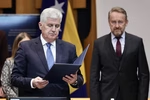Greece, Macedonia sign historic deal renaming Macedonia

Greek Foreign Minister Nikos Kotzias and his Macedonian counterpart Nikola Dimitrov on Sunday signed an accord to rename the former Yugoslav republic the Republic of North Macedonia, Reuters reported.
Oglas
The historic deal was agreed after 27 years of dispute and long, tough negotiations which burdened relations between the two countries and stopped Macedonia from joining the European Union and NATO. As a result, Macedonia joined the UN under the temporary name the Former Yugoslav Republic of Macedonia.
“We have a historic responsibility that this deal is not held in abeyance, and I am confident that we will manage it,” Greek Prime Minister Alexis Tsipras said at the signing ceremony in Prespes, a lake region which borders Greece, Macedonia and Albania, which he attended with his Macedonian counterpart Zoran Zaev.
Tsipras survived a no-confidence vote mounted by Greece’s opposition in parliament on Saturday, but the depth of public emotion against the deal is strong as up to 70 percent of Greeks object to the compromise, an opinion poll by the Proto Thema newspaper showed on Saturday.
Oglas
Under the deal, Greece will lift its objections to the renamed nation joining the EU and NATO.
"Our two countries have to turn from the past and look to the future," Zaev said. "We were bold enough to take a step forward."
Greece has been in dispute with Macedonia since 1991 over the former Yugoslav republic’s name, arguing it could imply territorial claims over the Greek province of Macedonia and an appropriation of ancient Greek culture and civilization.
The subject is an emotional one for many Greeks. On Saturday, thousands of protesters outside the parliament building shouted “Traitor, traitor!” as lawmakers debated inside.
Oglas
Veteran UN mediator Matthew Nimetz, who has been overseeing talks for a quarter century, described the agreement as an honourable deal.
Kakvo je tvoje mišljenje o ovome?
Učestvuj u diskusiji ili pročitaj komentare
Oglas
Kakvo je tvoje mišljenje o ovome?
Učestvuj u diskusiji ili pročitaj komentare
Oglas
NAJČITANIJE
Oglas
Oglas
Najnovije
Oglas
Oglas





 Srbija
Srbija
 Hrvatska
Hrvatska
 Slovenija
Slovenija



























































